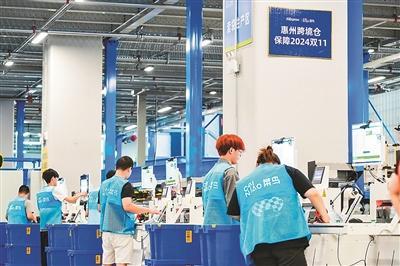Expansion of global free shipping zone drives growth of cross-border e-commerce
Apart from east China's Jiangsu and Zhejiang provinces and Shanghai, the global free shipping zone of various e-commerce platforms has now expanded. For example, Taobao, Alibaba's online marketplace, has included 10 countries and regions in its global free shipping zone. These include Singapore, Malaysia, Thailand, Japan, South Korea, Vietnam, and Cambodia.
As a result, overseas customers placed a significant increase in orders on relevant e-commerce platforms. On Alibaba's Tmall, nearly 70,000 businesses experienced a doubling in cross-border transaction volume during this year's "Double 11" shopping festival in November.

Staff members of Cainiao Network, Alibaba's logistics arm, work at a cross-border warehouse in Huizhou city, south China's Guangdong Province. (Photo/Cai Nian)
In July, Taobao introduced a global free delivery policy for apparel and accessory shop owners, which was later extended to businesses across all sectors two months later. During the "Double 11" shopping festival, the number of products eligible for free cross-border delivery expanded to include apparel, accessories, cosmetics, electronic products, fashion toys, mother and baby products, home products, and sports products.
In August, a shop specializing in home textiles and cloth art joined Taobao's global free delivery program and began receiving overseas orders.
"At first, I believed it was all about the ease of selling our products worldwide with a single click. However, I soon discovered another dimension to global selling - the ability to send individual items overseas," said Cai Manman, the shop owner.
"We simply have to manage the logistics expenses from our warehouse to the consolidation warehouse, while the platform takes care of the international shipping costs," she said.
The enhancement of logistics infrastructure is the key for e-commerce platforms to expand their global free shipping zone.
This year, Cainiao upgraded its nationwide distribution center in Spain and established a regional distribution center in France, both operational before the "Double 11" shopping festival. Now, Cainiao has started to serve local customers in Spain for their logistics needs during promotional activities.
The initial group of merchants who joined the global free delivery program have already seen positive results. A shop selling plus size women's clothing has received over 5,000 overseas orders since joining the global free delivery program.
"We have been selling over 1 million yuan (about $137,835) worth of products overseas each month without any increase in operational costs," said a representative from the shop.
The expansion of the global free shipping zone also offers Chinese merchants a better opportunity to understand the preferences of international consumers.
Li Yang, founder of Anka Bella, a children's face painting supplies brand, values the brand recognition among overseas consumers. "Our aim is to establish a global brand. Through free delivery, we have gained more recognition from overseas customers, enhancing our international influence."
After operating for several months, Li observed differences between overseas and domestic consumers. "Domestic consumers prefer lighter, less saturated colors, while consumers in the U.S. and Europe prefer personalized, vibrant colors. We spent about a month updating our products based on this distinction, adjusting colors to better meet the needs of overseas consumers," said Li.
"In July this year, Anka Bella began expanding its overseas business. Initially, the monthly sales were only a few thousand yuan, but last month it reached over 200,000 yuan in sales, growing rapidly," said Li.
Along with the growth in performance, Anka Bella is also promoting traditional Chinese culture overseas.
"2024 is the Chinese zodiac Year of the Dragon, and we have launched dragon-themed designs that are well-received by overseas consumers. We have previously introduced designs featuring dragon boats, the mythical Chinese goddess Chang'e, and the Jade Rabbit, the pet of Chang'e, which have also been popular among overseas consumers. With the expansion of the global free shipping zone, we hope to not only sell our products to more countries and regions but also spread traditional Chinese culture even further," Li expressed.
"In the future, we will further improve localization efforts, gain a deeper understanding of overseas cultures, integrate local culture with our products, and introduce more unique products. Additionally, we plan to establish our own overseas warehouse to enhance logistics efficiency and strive to deliver products to overseas consumers within one to two days," Li added.
For overseas consumers, the expansion of the global free shipping zone not only reduces costs, but also shortens cross-border delivery times, allowing them to engage in cross-border shopping more effectively.
Many overseas consumers have expressed that they prefer to buy phone cases, stationery, and books from Chinese e-commerce platforms due to the wider selection and lower prices.
According to a white paper on the trend of development of China's cross-border e-commerce exports released in 2024, China's overseas retail e-commerce market is expected to reach $3 trillion in 2024, with overseas retail e-commerce accounting for 12.5 percent of total retail sales.
The significant size of the overseas market, coupled with its low e-commerce penetration rate and high growth rate, provides Chinese merchants with the confidence to expand their international business.
Photos
Related Stories
- GAC announces optimization of regulatory measures for cross-border e-commerce exports
- Feature: China's excavators, rollers dig long-haul success abroad via e-commerce
- Chinese man's English skills boost cross-border online sales
- China’s e-commerce giants report robust sales during 2024 'Double 11' shopping festival
- A glimpse of China's annual "Double 11" shopping festival
Copyright © 2024 People's Daily Online. All Rights Reserved.









